At the end of each semester, Miami University students are asked to fill out course evaluations for their professors. The purpose of the evaluations is to inform professors and their department chairs of how they’ve performed over the semester.
Although students fill out evaluations each semester, they don’t have access to what other students have submitted in previous semesters.
The course evaluations students receive and fill out are vital to the Miami administration and departments, as they dictate structural changes for courses, faculty salary and overall job security for professors.
Student course evaluations weren’t always inaccessible to students, said Associate Provost Jeffrey Wanko.
“The data was made public to the Miami student body within the Miami University registrar probably around 8 or 10 years ago,” he said.
Wanko said that, because of a lawsuit filed against the university, the data had to be removed from public view.
The lawsuit stated that if the data was not altered to better accommodate those suffering from disabilities – like the vision impaired – and work more effectively for broader community usage, then it had to be removed.
But reforming the data to the standards that the lawsuit required would be expensive.
“To completely remediate all of the data within the PDF file that the course evaluations were published upon, it would cost tens of thousands of dollars,” Wanko said. “Miami just couldn't pay that.”
In absence of these public course evaluations, students have found other methods to learn more about their prospective professors.
Websites like Rate My Professors, a review site where college students are able to write and research anonymous reviews and ratings on professors around the country, are widely popular with college students. Rate My Professors has over 15 million ratings on over 1.3 million professors and educators in its database.
Unlike Miami’s course evaluations, these reviews are published for anyone to see.
Enjoy what you're reading?
Signup for our newsletter
Sophomore kinesiology major Gavin Schoelkopf said he finds the website extremely helpful while he is registering for classes each semester. He said he mainly utilizes the site to decide if a certain course or professor is going to be too difficult for him or not, and he makes his decisions on courses to take based on those reviews.
But Schoelkopf notes his class decision making would be significantly easier if he didn't have to use this external source of information and expressed interest in seeing the course evaluation data for each prospective course that he may sign up for.
“It would just make things so much easier,” he said, “And I would trust data coming from Miami way more than I would trust the reviews on some website.”
Jason Osborne, Miami Provost and Executive Vice President for Academic Affairs, and Dana Cox, Special Assistant to the Provost for Faculty Affairs, both stated that the course evaluation data would not be information that would be shared with the student body and is to be kept for only faculty and administrational use.




